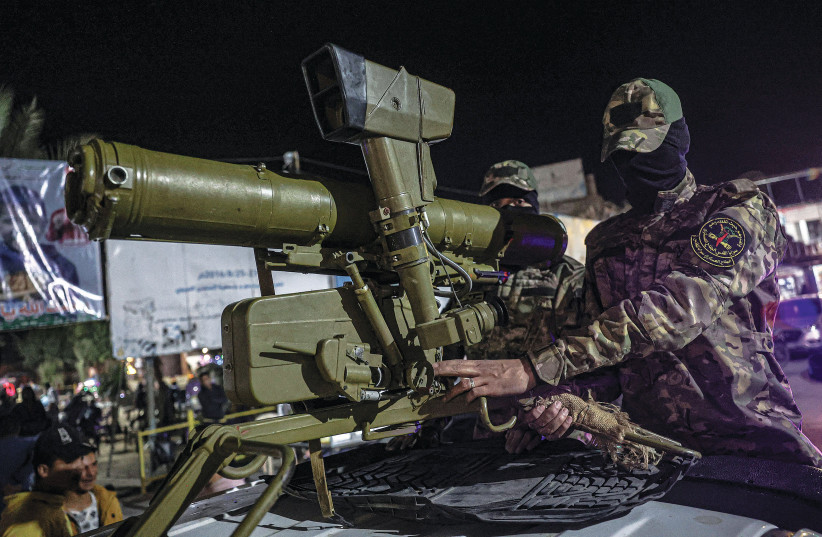Israel’s security forces have spent days on high alert throughout Israel’s South following the arrest in Jenin earlier this week of Palestinian Islamic Jihad senior member Bassem Saadi, the head of the terrorist organization’s operations in the West Bank.
Fearing PIJ retaliation that could potentially target Israeli vehicles in the South, the army imposed road closures throughout Gaza border communities beginning Monday, and have continued throughout this past week. Sapir Academic College in Sderot started holding classes online pending a change in security tensions, and life in other spheres has also been interrupted.
PIJ is known to have anti-tank guided missiles and has targeted both civilian and military vehicles in Israel, killing civilians and soldiers in the process. Saadi in particular was pushing to restore such operations of PIJ, according to a Shin Bet (Israel Security Agency) assessment.
A real and imminent threat
Israel’s security apparatus confirmed that this intense reaction was due to a real and imminent threat from terrorist organizations.
The concern for the safety of Israeli citizens and soldiers is therefore fully justified. If a car with civilians was targeted and hit by PIJ, there would be cries that the proper precautions weren’t taken by our security forces. As such, Prime Minister Yair Lapid held a security assessment the day after the arrest with Alternate Prime Minister Naftali Bennett, Defense Minister Benny Gantz and other security officials to determine what should be the next step.

While throughout the days after Saadi’s arrest several closed roads were reopened, the vast majority are still locked down to all civilian vehicles. On top of that, more than 100 reservists have been called in by the IDF to bolster the Gaza Division. The security units in the area are at the highest level of alert, with the Iron Dome missile-defense system ready for any sign of potential rocket fire.
Israel’s leaders have been quick to speak out on the matter.
“Any threat to the citizens of Israel will be met with a powerful response and we will of course be prepared for any scenario.”
Israeli Defense Minister Benny Gantz
“Any threat to the citizens of Israel will be met with a powerful response and we will of course be prepared for any scenario,” Gantz said on Tuesday. “We will continue this operational activity where and when required,” he added the following day.
In terms of security forces, the IDF is learning from experience and applying lessons learned from last year’s Operation Guardians of the Wall to fend off any threat to civilian safety.
However, after three consecutive days of living with closures and curfews, it’s time to ask who has the upper hand here – Israel or the terrorists in Gaza.
Untenable situation
It’s an untenable situation for Israelis to live in fear because a terrorist leader was arrested. Freezing the entire South makes living there – already difficult due to the years of rocket attacks from Gaza – a nearly impossible task.
One of Israel’s biggest projects over the past few years has been bringing people to live in the South. Infrastructure, business, accessibility – so many different aspects of life have been brought and adapted to the South in an effort to help populate the region.
Can Israel really accept a situation, then, in which the entire South can be shut down because Israel arrested one man? Is this not counterproductive to the point of dysfunction?
Qatar and Egypt are trying to mediate with Hamas and PIJ in order to de-escalate the situation. But no diplomatic solution can come fast enough, and Israel is creating living conditions that are difficult and even make it impossible for citizens to keep their heads above water.
Israel is in a time of extreme change. Prices are spiking, people are returning or recovering from the coronavirus pandemic, and elections are around the corner. The next government of Israel must make it a priority to structure Israel’s security response in a way that makes living in the country’s South fully livable.
Israeli officials have promised to provide financial compensation to those affected by the current situation, as many residents have no way of getting to and from work due to the road closures.
While we must weigh the safety of our citizens above all else, we cannot at the same time be held hostage. That in itself would be a victory for the very terrorists we seek to punish.
While safety is a top concern, living under a security lockdown with no end in sight and no updates from authority figures is simply no way to live.
